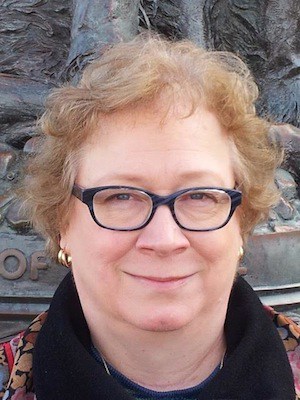Ann has become an important part of our Noteflight creative community, both musically and in the relationships she has formed with other users. She is an accomplished scientist who studied music early in life, and came back to composing when she discovered Noteflight in 2013.
Tell us about your personal and musical background.
I first learned music on the recorder, then the clarinet, and I sang in choirs. I minored in music in college but found it a handicap not to have learned keyboards. I was stuck trying to figure out bass clef just to read a chord, so everything took me at least three times as long as it should have. I couldn’t even play my own compositions. The only things I had going for me were a love of music and “a gift for melody,” according to one of my teachers. In graduate school I learned the harp, my first instrument that could play harmonies. I didn’t learn much theory though — it was all performance-based.
You are a scientist — tell us more about that!
I couldn’t figure out what to study in college. I loved reading, writing and music, but I also loved nature. I ended up choosing science because I didn’t have enough formal training in music to succeed. I am now a molecular biologist working in the field of protein evolution. Pretty esoteric, and talk about using different parts of the brain! Though I must say, it’s not uncommon for scientists or others with a mathematical bent to make music as well. I don’t know how many scientists are also composers.
What is some of your favorite music to listen to, and how does it feed into your composing?
I have always liked classical music, especially Bach. I love Brahms, Schubert and Schumann, Berlioz, Debussy, Ravel, Fauré. Handel’s Messiah. Stravinsky and Shostakovich, Vaughn Williams. Early music as well: Josquin des Prez and others. And always choral music. Too many favorites to name! Now I listen to the pieces I find on Noteflight, written by other users, which has expanded my musical horizons.
My pieces tend to have fairly traditional harmonies, and they are typically programmatic, telling a story through music, like some of my favorite composers. My music is melody-driven, and I often use chords that would work on a harp (four fingers, not five). And almost all my pieces have lyrics. I write as a complete amateur, having had no composition or orchestration training.
How did you discover Noteflight, and how it has affected your musical life?
I love singing, and over time I wrote some songs that seemed worth keeping. I had no way to make them into full musical arrangements, and no one to do it for me. Then one day after listening to me complain, a friend suggested I should arrange them myself. So I did what I wish I had done years before: I googled music notation software and found Noteflight. At last there was a way to put music down on “paper” and then hear how it sounded. I wrote out the songs I had stored up over the years — my first pieces on Noteflight — and then began to experiment beyond those songs. I have been obsessed with writing music for a year and a half now. I find myself enjoying it tremendously, and I get so focused on it that everything else falls away. I listen to other works with a new ear for how they are put together. And I am amazed that with Noteflight I can write music the way I hear it, and share it with others.
How do you go about the process of composing?
Each song is different from the rest. Some are accidents — in one case I started with a harmonic sequence that sounded lovely, and that set me off on a piece that became much different than I had expected. Usually I start with a complete melody, then I add the harmony. Many of the best sounds happen by serendipity. Sometimes it comes to me all in a rush: in one case I wrote a whole piece in one night. Most come over several weeks, but my latest hast taken six months and counting. It’s a very big score for a full orchestra and chorus. Other Noteflight users have urged me on, not giving me a quick pat on the head but demanding more. Bit by bit I have learned.
What aspects of Noteflight do you find especially useful?
Of course the notation editor comes first. Otherwise I wouldn’t have started writing music. But I also appreciate the community on Noteflight. I have met great kids and adults on the forums and in the scores. And I’m still looking for people willing to listen to what I hear and give feedback, so sharing is a great feature.
What are your musical plans and hopes for the future?
My musical hopes and dreams? To keep growing as as a composer and to learn theory. And to some day have a harp again. Maybe to have some of my pieces performed live someday.
We would love to hear some of your music!
Here are a couple of examples.
Love Song is eleven minutes long and very melodic.
The next big piece, Love’s Reply, was originally meant to be a second movement for Love Song. But they are stylistically so different that I may make them stand-alone pieces. For Love’s Reply, percussion is the bedrock on which it is built — my attempt to use the method I see in so many other pieces on Noteflight. Here I wrote the music first and the words second.
What else would you like us to know?
In some ways I am not your standard “Notepilot” (as some call us). I am old enough to be a grandmother to many Noteflight users! The music I write is not a movie trailer, or a rock song. It is not a brilliant piano sonata. I still don’t know how to play or write for piano, I still don’t know the rules for music theory, and I can’t identify all my chords or progressions: I write by ear. I’d love to know how to do all those brilliant modulations I see other people write. Some day I’ll pick up a theory book and learn. There are plenty of other older Noteflight users, though. Each of us has a distinctive sound, which I think is a good thing. And all the Noteflight users I interact with have been very welcoming.

